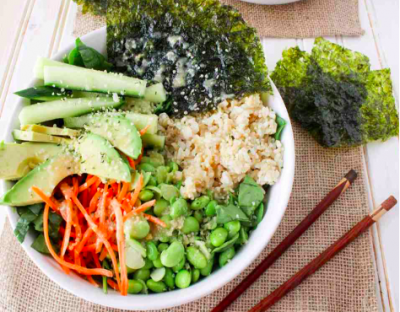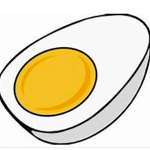Written by UConn Dietetics student Breanna Karabeinikoff
The Academy of Nutrition and Dietetics states that thoughtfully planned vegetarian or vegan diets are nutritionally adequate and appropriate for all stages of life, including pregnancy, infancy, childhood, and older adulthood1. These diets may provide several health benefits. Vegans and vegetarians have reported a lower risk of developing chronic conditions, such as type 2 diabetes, obesity, hypertension, and certain types of cancer1. This could be because vegan and vegetarian diets are lower in saturated fat and do not contain added sodium or sugar, which are major factors in the development of chronic diseases. Additionally, vegetarian and vegan diets are unique in that they consist solely of plant-based foods such as fruits, vegetables, legumes, whole grains, nuts, and seeds. These foods are high in fiber and contain compounds called phytochemicals, which play a role in reducing low-density lipoprotein (LDL) cholesterol levels. These lipoproteins are the most significantly associated with cardiovascular disease1.
So, what is the difference between a vegan and vegetarian diet?
- Vegan: an individual who does not consume or utilize any animal products
- Vegetarian: an individual who excludes meat from their diet, but consumes eggs and dairy products and may eat fish.
 Overall good nutrition and nutrient deficiencies are a common concern when beginning to try any diet or “lifestyle of eating” for the first time. Here are nutrients to pay special attention to with vegan/vegetarian diets:
Overall good nutrition and nutrient deficiencies are a common concern when beginning to try any diet or “lifestyle of eating” for the first time. Here are nutrients to pay special attention to with vegan/vegetarian diets:
- Vitamin B12: Vitamin B12 is naturally found in animal products, especially red meat. It is needed for red blood cell formation. Red blood cells are responsible for supplying oxygen throughout the body, therefore, it is crucial for vegetarians or vegans to include a vitamin B12 supplement, fortified cereal product, or soy milk into their diets to prevent some health complications, such as anemia2.
- Omega 3 Fatty Acids: Omega 3 fatty acids are important for heart health. Omega 3 fatty acids reduce inflammation in the
 body that can lead to heart disease and strokes. Rich sources of Omega 3 fatty acids are fish and eggs. However, great plant-based sources of Omega 3 fatty acids are ground flax seeds, chia seeds, walnuts, and hemp seeds2.
body that can lead to heart disease and strokes. Rich sources of Omega 3 fatty acids are fish and eggs. However, great plant-based sources of Omega 3 fatty acids are ground flax seeds, chia seeds, walnuts, and hemp seeds2. - Iron: Iron is an essential mineral that plays a role in several important body processes, like oxygen transport, immunity, and maintenance of healthy skin, hair, and nails3. Iron is not as readily absorbed from plant foods as it is from meat sources, so eating an abundance of foods such as leafy green vegetables, nuts, and beans would be very beneficial2. In addition, pairing these iron-rich foods with foods high in vitamin C, like bell peppers or citrus fruits, can help increase absorption! Think: spinach salad with strawberries!
- Vitamin D: Also known as the sunshine vitamin, Vitamin D is a nutrient concern for all populations. Vitamin D helps absorb calcium in order to support bone health and prevent osteoporosis 3 (weak and brittle bones). Vitamin D is found in fortified cereals and plant-based milk, and foods like sardines and egg yolks. Another good way to absorb vitamin D would be to sit in the sun for about 15 minutes per day! If longer than that, be sure to wear SPF 15 sunscreen!
- Iodine: Iodine is a micronutrient that is often overlooked by health professionals. Our bodies need iodine in order to create thyroid hormones that control our body’s metabolism3. Iodine is found in tuna, shrimp, and other seafood, as well as milk, yogurt, and cheese3. Vegans and vegetarians can cook with iodized salt or consume sea vegetables, such as kelp and nori, in order to prevent deficiencies of this nutrient.
Below is a recipe that would be perfect for families to cook in the springtime! This recipe is simple to make and packs key nutrients in every bite! Main staples in this recipe are nutritional yeast (vitamin B12 source), edamame (iron source), seaweed snacks (iodine source), and hemp seeds (omega 3 source). Additionally, this meal is super satisfying because of the fiber from the brown rice, plant-based protein from the edamame, and healthy fats from the avocado.
Deconstructed Sushi Salad Bowl

Ingredients
- Salad Bowl:
- 4 cups chopped baby spinach
- ⅔ cup cooked brown or white rice
- 1 ½ cup shelled edamame
- ½ cucumber sliced into strips
- ½ cup shredded carrots
- 8-10 seaweed snacks or nori
- ½ avocado sliced
- 2 tbsp hemp seeds or sesame seeds
- 3 tbsp nutritional yeast (optional)
- Sesame Ginger Miso Dressing:
- 1 tbsp miso
- 2 tbsp warm water
- 1 tbsp toasted sesame oil.
- 1 tbsp apple cider vinegar
- 1 tsp fresh grated ginger
- 1 tsp maple syrup (optional)
Instructions
- Add spinach to bowls and top with sections of brown rice, edamame, cucumber, carrots, seaweed, and avocado. Sprinkle hemp seeds on top.
- Add miso and water to a small bowl and mix with a fork until combined. Add remaining dressing ingredients and mix. Drizzle over salad bowls and serve. (If preparing salad ahead of time/to-go, leave dressing on side until ready to eat.)
Servings: 2-3 Recipe and photo courtesy: Stephanie McKercher, RDN
References:
- Melina, V., Craig, W., & Levin, S. (2016). Position of the Academy of Nutrition and Dietetics: Vegetarian Diets. Journal of the Academy of Nutrition and Dietetics, 116(12), 1970–1980. https://doi.org/10.1016/j.jand.2016.09.025
- Vegetarian diets: Vegan, Lacto-Vegetarian, OVO-VEGETARIAN, healthy, and balanced diet. (2020, September 01). Retrieved February 26, 2021, from https://www.webmd.com/food-recipes/guide/vegetarian-and-vegan-diet
- Dietary supplement fact sheets. (n.d.). Retrieved February 26, 2021, from https://ods.od.nih.gov/factsheets/list-all/
This material is funded by UDSA’s Supplemental Nutrition Assistance Program (SNAP).
This institution is an equal opportunity employer.
 body that can lead to heart disease and strokes. Rich sources of Omega 3 fatty acids are fish and eggs. However, great plant-based sources of Omega 3 fatty acids are ground flax seeds, chia seeds, walnuts, and hemp seeds2.
body that can lead to heart disease and strokes. Rich sources of Omega 3 fatty acids are fish and eggs. However, great plant-based sources of Omega 3 fatty acids are ground flax seeds, chia seeds, walnuts, and hemp seeds2.